Does a VPN Drain the Battery? Tips to Avoid VPN Battery Drain [Updated]

Arsalan Rathore
![Does a VPN Drain the Battery? Tips to Avoid VPN Battery Drain [Updated]](https://www.astrill.com/blog/wp-content/uploads/2023/10/Does-a-VPN-Drain-the-Battery-800x470.jpg)
A VPN can drain your device’s battery quicker due to the additional computational processes, data routing, and constant connectivity it demands. While the added security and privacy benefits are valuable, it’s essential to be mindful of these factors, especially on mobile devices with limited battery life.
In this guide, we’ve explained everything related to the battery consumption of the VPN and tried to answer the most asked question: “Does a VPN drain the battery?”
So go through the guide, learn why a VPN drains battery, and learn the tips on optimizing your device’s battery life while using a VPN.
According to McAfee, Malware and unwanted software are often major culprits behind rapid battery drain on Android devices, silently running in the background and consuming valuable resources
Table of Contents
VPN Battery Drain Experiment
We experimented to measure the impact of VPN usage on battery drain across the following devices:
- iPhone
- Android smartphone
- Laptop
This experiment aimed to test how VPNs affect battery life on various devices. Following were the testing protocols carried out with every device:
- Phones and the Laptop were fully charged before use.
- Devices were connected to a Germany-Frankfurt Server.
- Streamed Netflix for 60 minutes on all devices with a VPN connection.
- Streamed Netflix for 60 minutes on all devices without a VPN connection.
Does VPN drain iPhone battery?
Yes, VPNs typically increase iPhone battery consumption by 5-15% per day, but the impact varies significantly based on the protocol used, connection frequency, and your usage patterns. Modern VPNs like AstrillVPN with WireGuard protocol minimize this drain to just 3-8% daily.
iPhone VPN Battery Drain Test
We used AstrillVPN on iPhone 13 Pro Max for the iPhone VPN battery drain test, having iOS version 17.5.1, and the results are as follows:
| With a VPN Connection | Without a VPN Connection | |
| Initial battery level | 100% | 100% |
| Final battery level | 70% | 81% |
| Battery consumed | 30% | 19% |
The variance between the battery drain with and without a VPN on an iPhone is around 11%, which shows that if the VPN is used smartly on the device, there would be no issue.
Does VPN drain Android battery?
Yes, VPNs typically use an extra 8-12% battery on Android devices daily, but newer protocols like WireGuard reduce this to just 4-7%. The security benefits far outweigh this minimal battery cost.
Android VPN Battery Drain Test
We used a Samsung S23 Ultra with an Android version for the Android device VPN battery drain test.
| With a VPN Connection | Without a VPN Connection | |
| Initial battery level | 100% | 100% |
| Final battery level | 89% | 92% |
| Battery consumed | 11% | 8% |
The difference in battery consumption with and without a VPN on an Android device is just 3%, which is negligible. This shows that a VPN on an Android device doesn’t drain much battery.
Laptop VPN Battery Drain Test
We used a Lenovo IdeaPad Creator 5 15 with Windows 11 pro version for the VPN drain test. Following were the results with and without the VPN usage:
| With a VPN Connection | Without a VPN Connection | |
| Initial battery level | 100% | 100% |
| Final battery level | 22% | 45% |
| Battery consumed | 78% | 55% |
Since laptops have a lot of processes running in the background, the battery consumption is always high. The difference in battery consumption on a laptop with and without a VPN is 23%, which is very high.
Why does using a VPN drain the battery quicker?
VPN is a powerful tool for enhancing online security and privacy and accessing geo-restricted content. However, it has drawbacks, including the potential impact on battery life, especially on mobile devices. There are several reasons why using a VPN can drain your battery quickly:
Encryption level
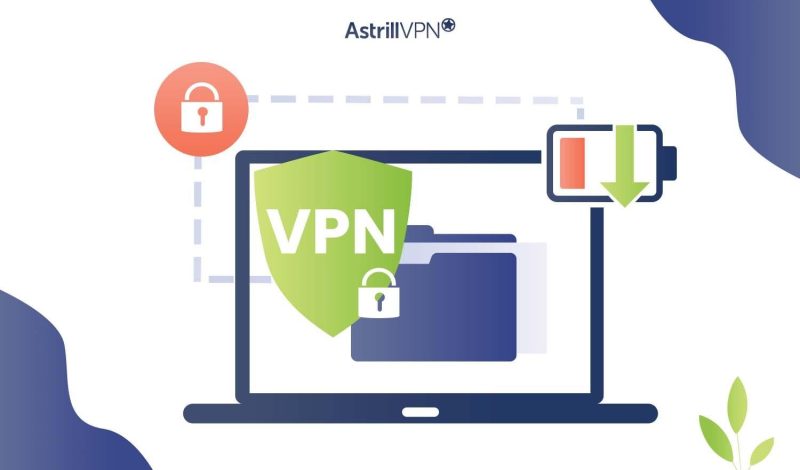
One of the primary reasons is the level of encryption employed by VPNs. VPNs use encryption to secure your data and protect your privacy. While this is essential for online security, it requires additional processing power, leading to higher battery consumption.
As your data is encrypted and decrypted before it’s transmitted over the internet, the constant encryption process can strain your device’s CPU, causing it to use more power than usual.
Data Routing
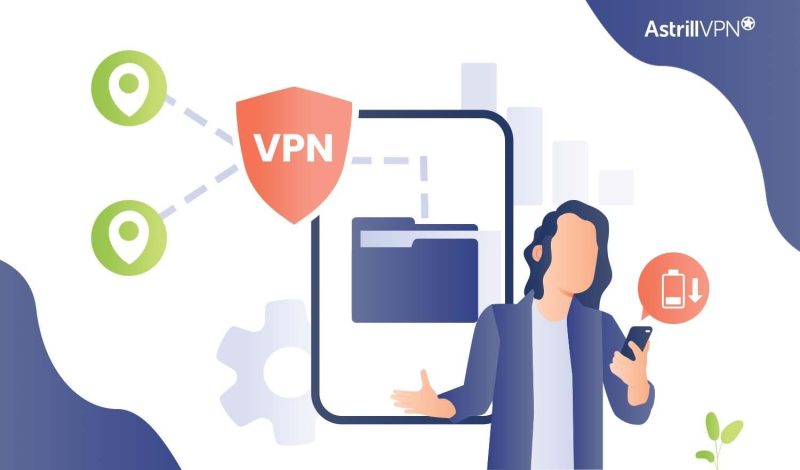
Data routing is another key factor contributing to increased battery drain when using a VPN. VPNs route your internet traffic through servers in various locations, often in different countries. Your data may take a more circuitous route to reach its destination. The additional “hops” that data makes can lead to longer data processing times and greater transmission distances, all of which require more power. This prolonged data routing can be particularly noticeable when connecting to servers that are geographically distant from your actual location.
Mobile Signal
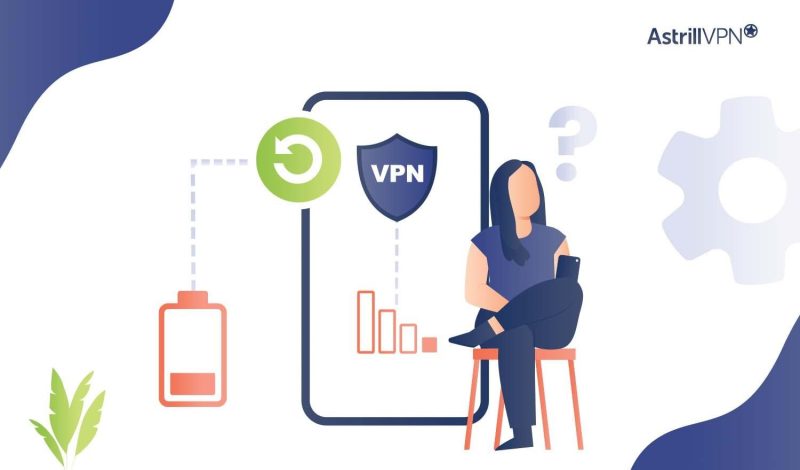
The strength and stability of your mobile signal play a role in how a VPN affects your battery. When your device’s signal is weak or fluctuating, it must work harder to maintain a stable VPN connection.
\This additional effort can increase the device’s power consumption. In areas with poor signal quality, you might notice a more significant battery drain when using a VPN, as the device constantly attempts to maintain a reliable connection to the VPN server.
Background Services
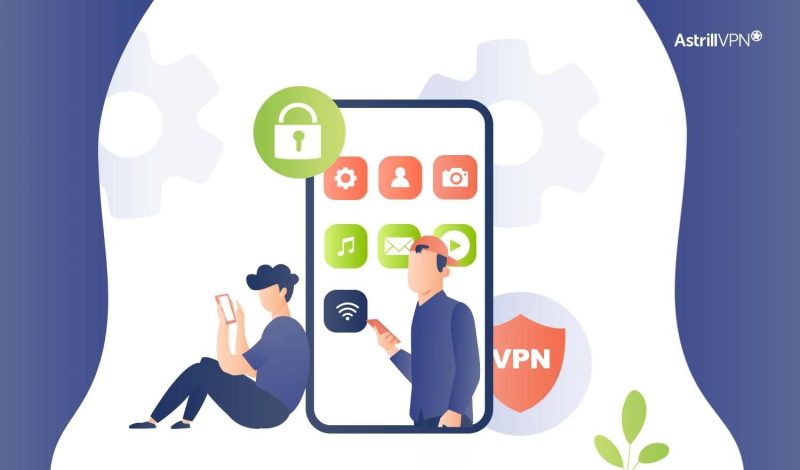
VPN apps often run in the background, even when you’re not actively using the internet. This continuous background operation ensures your VPN connection remains secure and ready for use.
While it’s a necessary feature for maintaining security, these background services can notably impact battery life. They keep your device’s network interfaces active, consuming power to sustain the VPN connection.
Choice of VPN Protocol
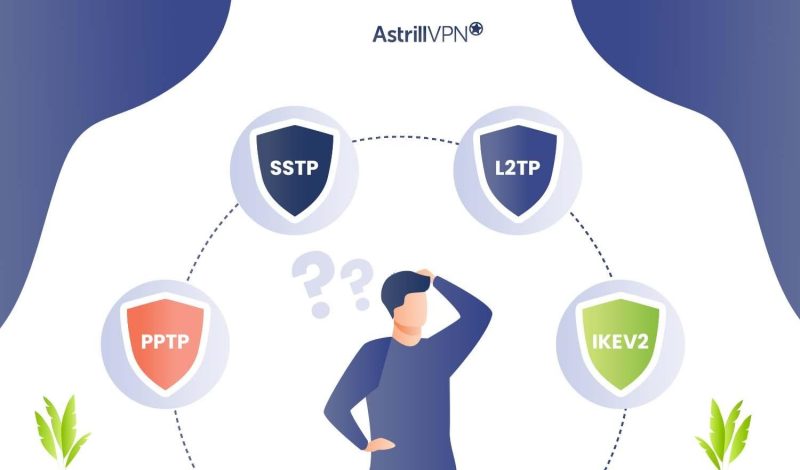
The choice of VPN protocol can significantly influence how a VPN impacts battery life. Different VPN protocols come with varying levels of encryption and data processing requirements. For instance, robust protocols like OpenVPN offer high security but tend to consume more battery power due to the intensive encryption processes.
In contrast, lightweight protocols like IKEv2 are less power-hungry, making them a better choice if you’re concerned about battery drain.
AstrillVPN offers four top-of-the-line VPN protocols:
If you’re looking for a VPN protocol that works well for browsing purposes only, choose OpenWeb protocol. However, if you’re looking for a protocol to protect your overall apps and system, go for StealthVPN.
Device Hardware and Software
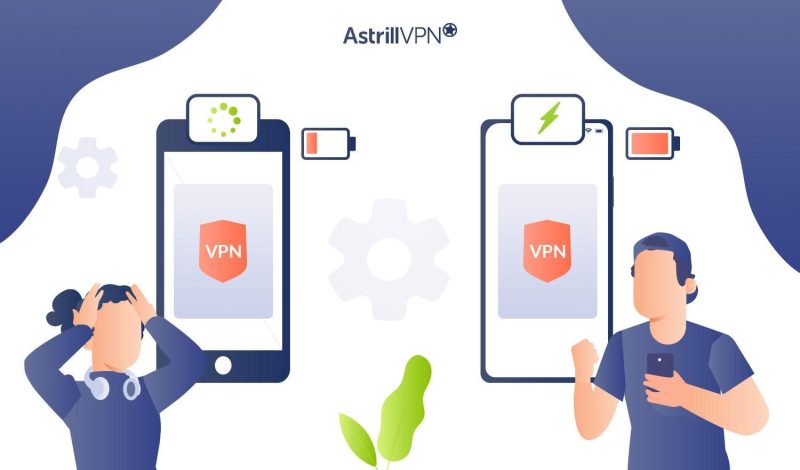
The specific device you use also plays a crucial role in determining how a VPN affects battery life. Newer, more powerful devices with larger batteries can handle the additional processing a VPN requires more efficiently than older or less capable devices.
Additionally, the efficiency of your device’s operating system and the quality of the VPN app can influence the overall impact on battery life. Therefore, not just the VPN itself but also your device’s capabilities and software matter.
Location and Network Conditions
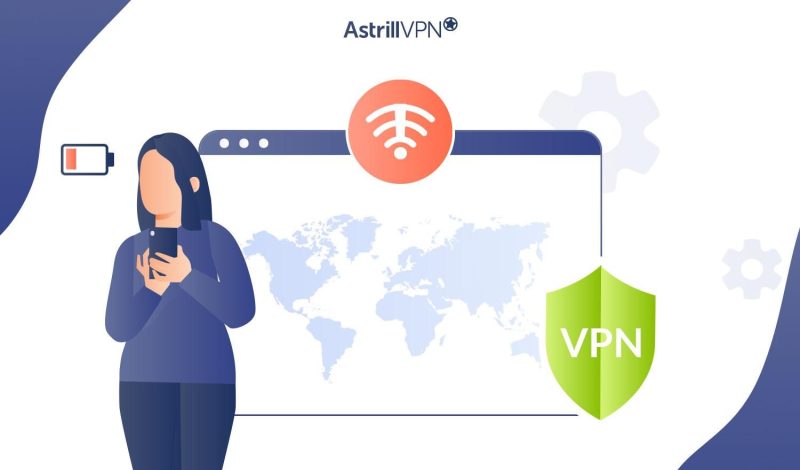
Your physical location and network conditions can also affect how much a VPN drains your battery. Data must travel greater distances when connecting to a VPN server far from your location. This can increase the time and processing required for data to reach its destination, leading to higher battery consumption.
Additionally, connecting to a VPN server in an area with weak or congested network conditions can exacerbate battery drain as your device struggles to maintain a stable connection.
Use On-Demand Connection
Enable “Connect on Demand” for specific apps or networks instead of always-on VPN:
- Settings → VPN → Connect On Demand
- Configure rules for WiFi networks vs cellular data
Essential Tips to Minimize VPN Battery Drain
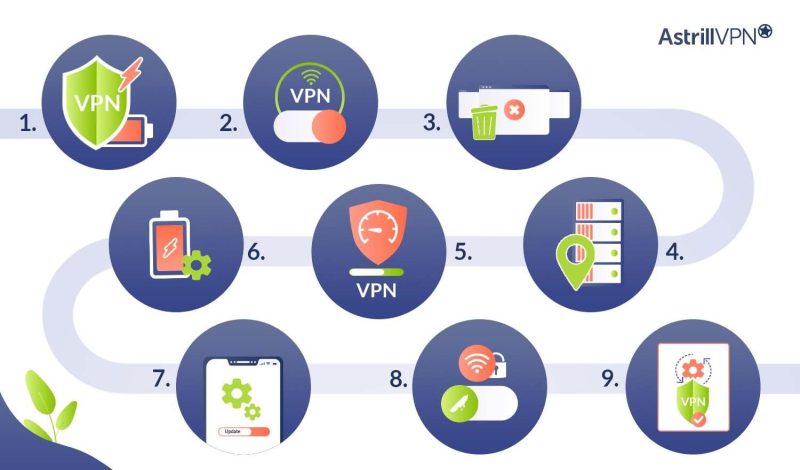
A VPN is critical for maintaining online privacy, protecting sensitive data, and bypassing geo-restrictions. However, it’s reasonable to want this protection without significantly compromising your device’s battery life, especially on mobile. Fortunately, with the right settings and strategies, you can reduce VPN-related battery drain without sacrificing security or performance.
1. Choose Lightweight, Energy-Efficient Protocols
VPN protocols directly affect battery consumption. Heavier protocols like OpenVPN over TCP are more secure but require more CPU cycles, which can lead to faster battery depletion.
Instead, switch to lightweight protocols like WireGuard, IKEv2/IPSec, or OpenWeb, AstrillVPN’s high-speed protocol optimized for performance and efficiency. These protocols establish faster connections and use less processing power, helping your device stay cool and last longer.
Pro Tip: In AstrillVPN’s app, go to Settings > VPN Protocol to select the most battery-friendly protocol based on your usage scenario.
2. Connect to the Nearest VPN Server
The farther your data has to travel, the more processing power your device uses to maintain a stable connection. Always connect to a server closest to your physical location when security is your primary concern, not geo-unblocking. AstrillVPN’s vast global server network makes finding nearby options that reduce latency and battery usage easy.
3. Use Split Tunneling to Limit VPN Use
Why encrypt all traffic when only some of it truly needs protection? With AstrillVPN’s App Guard (split tunneling), you can route only specific apps through the VPN while allowing others to use the regular internet. This selective routing minimizes encryption overhead and reduces overall resource consumption, resulting in better battery life.
4. Disconnect When VPN Protection Isn’t Necessary
If you’re on a trusted Wi-Fi network or simply scrolling through non-sensitive content, consider pausing your VPN connection. AstrillVPN makes it easy to toggle the connection on or off directly from the app or system tray. Minimizing unnecessary VPN uptime avoids background encryption cycles that use additional battery power.
5. Avoid Battery-Draining Apps Running in Parallel
Streaming apps, social media platforms with auto-refresh, and cloud sync services can cause your device to work harder when paired with a VPN. Regularly close unused apps, disable background refresh, and limit notifications while connected to a VPN to reduce power consumption.
6. Keep Your VPN App and OS Updated
Battery-saving improvements are often introduced through app updates. AstrillVPN frequently releases updates that optimize protocol efficiency, reduce app background activity, and eliminate resource-heavy behaviors. Keeping your VPN app and device OS updated ensures you benefit from the latest enhancements.
7. Use Astrill’s Kill Switch and Auto-Restart Features Strategically
AstrillVPN’s Kill Switch and Auto-Restart feature protect your connection if the VPN disconnects unexpectedly. However, on unstable networks, constant reconnection attempts can impact battery life. If you’re on mobile data with frequent dropouts, consider adjusting your settings or switching to a more stable protocol to minimize energy usage.
8. Prefer Wi-Fi Over Mobile Data
When using a VPN on mobile devices, always choose Wi-Fi instead of 4G or 5G connections. Cellular data connections require more energy to maintain an encrypted tunnel. Wi-Fi helps save battery and usually offers better speeds and connection stability.
9. Monitor Your Device’s Battery Usage
Modern smartphones and laptops allow you to monitor which apps use the most power. Keep an eye on VPN-related battery usage in your system settings. If the VPN appears to be consuming more than expected, try changing protocols, adjusting settings, or limiting VPN usage to essential apps only
Why security is more important than battery
The debate between prioritizing security or battery life when using a VPN is important and ultimately boils down to your individual needs and circumstances. However, in many cases, security should take precedence over battery life. Here are several reasons why:
1. Protection of Sensitive Data
Security is paramount when it comes to the protection of sensitive information. When you use a VPN, your data is encrypted, making it nearly impossible for cybercriminals and eavesdroppers to intercept and exploit it. This level of encryption ensures that your personal information, financial data, login credentials, and other sensitive details remain confidential and safeguarded against potential threats.
2. Online Privacy and Anonymity
Security plays a vital role in safeguarding your online privacy and anonymity. By hiding your IP address and routing your internet traffic through remote servers, a VPN shields your online activities from prying eyes, including internet service providers, advertisers, and even government surveillance. This increased privacy is crucial for those who value anonymity and freedom from surveillance.
3. Bypassing Censorship and Geo-Restrictions
VPNs provide a valuable tool for accessing geo-restricted content and bypassing censorship, which is especially important for individuals living in or traveling to regions with strict internet regulations. While using a VPN for this purpose might impact battery life, the benefits of unhindered access to information and content are often worth the trade-off.
4. Secure Public Wi-Fi Usage
Security should always be a top priority when connecting to public Wi-Fi networks, such as cafes, airports, or hotels. These networks need to be more secure and can expose your data to threats. A VPN provides a secure tunnel for your data to travel through, reducing the risk of data interception and ensuring your information remains protected, even on unsecured networks.
5. Business and Work-Related Activities
For business professionals and remote workers, security is non-negotiable. VPNs are essential for maintaining the confidentiality of company data and communications. Even if it means a slightly faster battery drain, the peace of mind that comes with knowing your business-related activities are secure is invaluable.
6. Prevention of Hacking and Cyberattacks
The risk of hacking and cyberattacks is ever-present in today’s interconnected world. Using a VPN reduces the likelihood of falling victim to various cyber threats, such as man-in-the-middle attacks or data breaches. This proactive security measure far outweighs any minimal reduction in battery life.
FAQ
Private DNS can consume slightly more battery due to the additional processing required for DNS queries. However, the impact is minimal and varies depending on the device and usage.
Casting YouTube to another device (e.g., a smart TV) may consume more battery on the casting device, but not significantly.
Watching Netflix or any streaming service on a mobile device can drain the battery more quickly due to the continuous screen and network activity.
Enabling YouTube’s dark mode can save battery life on devices with OLED or AMOLED screens. These screen technologies use less power when displaying dark or black backgrounds.
Yes, battery-saver mode can affect your VPN by restricting background activities and reducing app performance. This can lead to slower VPN speeds, interruptions, or even disconnections as the device prioritizes conserving battery over maintaining active connections.


No comments were posted yet